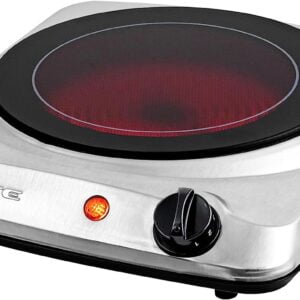Electric Induction Stoves: The Ultimate Fusion of Efficiency and Precision
Electric induction stoves are cutting-edge cooking appliances that combine the power of electricity with innovative induction technology. Unlike traditional electric stoves that use radiant coils, induction stoves utilize electromagnetism to directly heat the cookware, offering unparalleled efficiency, precise temperature control, and lightning-fast cooking times. Electric induction stoves have become the gold standard for modern kitchens, catering to the needs of professional chefs and home cooks alike. Let’s delve into the features, advantages, and considerations of electric induction stoves.
Features of Electric Induction Stoves:
Induction Technology: Electric induction stoves use electromagnetic fields to generate heat directly within compatible cookware. This direct induction heating eliminates the need for heating elements on the cooktop surface.
Electric Power Source: Induction stoves require electricity to power the induction coils and create the magnetic field that induces the electric current in the cookware.
Multiple Cooking Zones: Electric induction stoves typically have multiple cooking zones or burners, each with individual controls, allowing for simultaneous cooking with precise temperature adjustments.
Smooth Glass-Ceramic Surface: The cooktop surface is usually made of smooth glass-ceramic material, which is easy to clean and complements modern kitchen aesthetics.
Precise Temperature Control: Electric induction stoves offer precise and instantaneous temperature adjustments, giving cooks full control over cooking temperatures.
Fast Heating: Induction stoves heat up rapidly, reducing cooking times significantly compared to traditional electric stoves.
Energy Efficiency: Induction cooking is remarkably energy-efficient since the heat is generated directly in the cookware, resulting in less wasted heat and quicker cooking.
Safety Features: Electric induction stoves come with safety features, such as automatic shut-off and child lock controls, to enhance kitchen safety.
Advantages of Electric Induction Stoves:
Unmatched Efficiency: Electric induction stoves are incredibly energy-efficient, providing significant energy savings over time.
Precision Cooking: The precise temperature control allows for delicate tasks like simmering and melting, as well as precise searing and browning.
Rapid Cooking: Induction stoves heat up much faster than traditional electric stoves, reducing cooking times and enhancing overall kitchen productivity.
Safety and Convenience: The absence of open flames and the cool cooktop surface make induction stoves safe to use, with fewer risks of burns and fires.
Easy to Clean: The smooth glass-ceramic surface is easy to clean, and spills do not burn onto the cooktop, simplifying maintenance.
Considerations for Electric Induction Stoves:
Cookware Compatibility: Induction stoves require compatible cookware made of magnetic materials like cast iron or magnetic stainless steel. Non-magnetic cookware will not work on induction cooktops.
Initial Investment: Electric induction stoves can be more expensive than traditional electric stoves, but their long-term energy savings and cooking performance can justify the initial cost.
Learning Curve: Some users may need time to adjust to the cooking techniques and temperature control of induction stoves, as they heat differently compared to traditional stoves.
In Conclusion:
Electric induction stoves represent the pinnacle of cooking efficiency and precision. With their rapid heating, energy savings, and precise temperature control, they have become the go-to choice for many professional chefs and home cooks seeking top-notch cooking performance.
Despite the initial investment and cookware considerations, electric induction stoves offer an exceptional culinary experience that elevates your cooking endeavors to new heights. Embrace the modernity of electric induction stoves, and discover the joy of efficient and precise cooking in your kitchen.



